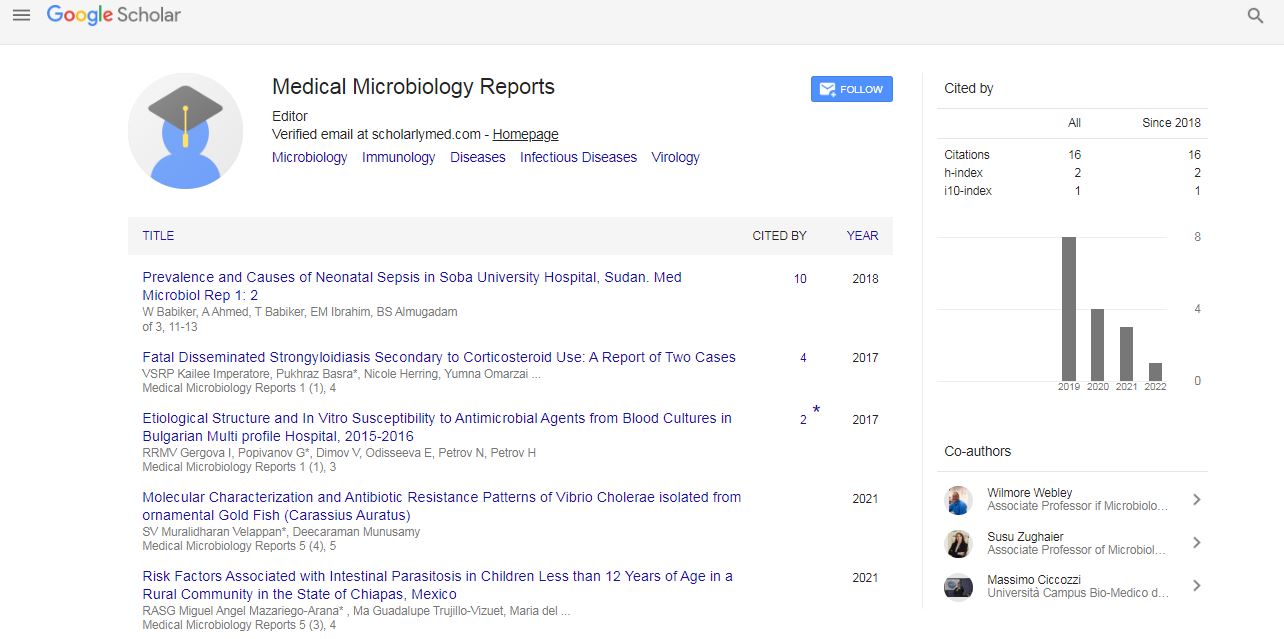Opinion Article, Med Microbiol Rep Vol: 7 Issue: 3
An Overview on Mycology: Its Ecological Importance and Biotechnological Advancements
Mamiko Aoki*
Department of Forensic Medicine, Nagoya City University Graduate of School Medical Sciences, Nagoya, Japan
*Corresponding Author: Mamiko Aoki,
Department of Forensic Medicine, Nagoya
City University Graduate of School Medical Sciences, Nagoya, Japan
E-mail: aokimamiko00934@edu.jp
Received date: 01 September, 2023, Manuscript No. MMR-23-117991;
Editor assigned date: 04 September, 2023, PreQC No. MMR-23-117991 (PQ);
Reviewed date: 18 September, 2023, QC No. MMR-23-117991;
Revised date: 25 September, 2023, Manuscript No. MMR-23-117991 (R);
Published date: 02 October, 2023 DOI: 10.4172/MMR.1000348
Citation: Aoki M (2023) An Overview on Mycology: Its Ecological Importance and Biotechnological Advancements. Med Microbiol Rep 7:3.
Description
Mycology, the scientific study of fungi, is a captivating and diverse field that delves into the enigmatic world of mushrooms, molds, yeasts, and a multitude of other fungal life forms. While often overshadowed by the more charismatic kingdoms of life, fungi play important roles in ecosystems, human health, and various industries.
Ecological importance
Fungi are a hidden force in the natural world. They are integral to ecosystems as decomposers, breaking down dead organic matter and recycling nutrients. Without fungi, the forest floors would be buried in leaf litter, and organic materials would accumulate, suffocating the growth of new life.
Mycorrhizal associations between fungi and plant roots are another fascinating aspect of fungal ecology. These mutually beneficial relationships enable plants to access nutrients like phosphorus and nitrogen from the soil, while the fungi receive carbohydrates from the plant. This cooperation underpins the health and vitality of numerous plant species.
Fungi also have a dark side. Many fungal pathogens threaten plants, animals, and humans. For instance, the chestnut blight caused by the fungus Cryphonectria parasitica, devastated American chestnut trees in the early 20th century. Understanding these pathogens is important for disease management and the conservation of various species.
Biotechnological advancements
In recent years, mycology has experienced a renaissance due to its burgeoning role in biotechnology. Fungi are emerging as a sustainable solution to address several global challenges.
Myco-materials: Fungal mycelium, the vegetative part of the fungus, has found use in creating bio-based materials. Myco-leather, Myco-foam, and Myco-board are eco-friendly alternatives to conventional materials. These Myco-products are not only biodegradable but also reduce the environmental footprint associated with resource-intensive industries.
Biodegradation: Fungi possess remarkable abilities to break down complex organic compounds. This property is leveraged to tackle plastic waste, oil spills, and other environmental pollutants. Researchers are exploring ways to genetically engineer fungi for enhanced biodegradation capabilities.
Pharmaceuticals: Fungi have been a prolific source of bioactive compounds, such as antibiotics and immunosuppressants. On-going research seeks to discover new drug candidates from fungi to combat emerging infectious diseases and drug-resistant pathogens.
Food security: Mycology plays an important role in the development of alternative protein sources. Fungi-based proteins are being explored as sustainable options for addressing global food security concerns. Additionally, mycologists are studying the potential of Myco-protein production as a replacement for traditional meat.
Mycology, the science of fungi, unveils a remarkable world that is rich in history, ecological significance, economic importance, and biotechnological promise. The study of fungi has come a long way from its humble origins, evolving into a discipline that touches on various aspects of our lives.
As we continue to discover the diverse roles that fungi play in ecosystems, agriculture, industry, and medicine, mycology remains a field ripe with possibilities. By utilizing the power of fungi for sustainable solutions, we are not only advancing scientific knowledge but also contributing to a more sustainable and harmonious coexistence with the natural world. Mycology is a testament to the idea that even the most inconspicuous organisms can hold the key to solving some of the world's most pressing challenges.
 Spanish
Spanish  Chinese
Chinese  Russian
Russian  German
German  French
French  Japanese
Japanese  Portuguese
Portuguese  Hindi
Hindi 
